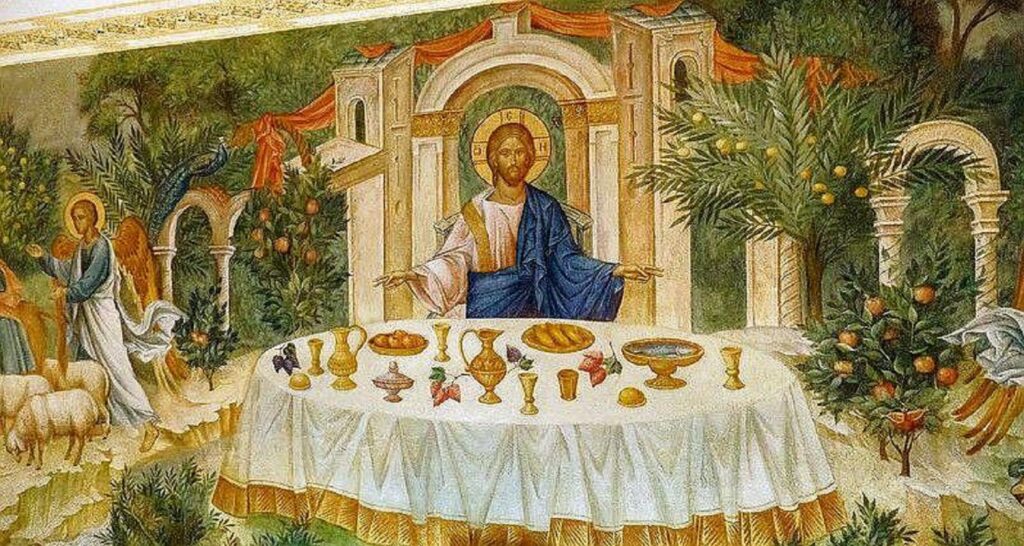I ponder whether Jordan Peterson is doing any good with his seminars on the Bible. I do not find him a clear thinker. An excerpt I happened to catch online recently seemed to me pretty weak. A view of faith and the tradition from the outside, and uncomprehending.
That may be the point. That may be what is needed for the greater public: an everyman to represent the audience, poking and prodding at this odd book and raising questions. What the heck is this all about? It may be a gateway for some.
Or it may be disastrous: an attempt to fit the Bible within Peterson’s false world view of clinical psychology.
The excerpt I heard was on the three temptations of Jesus in the desert, described to us by Matthew and Luke.
What struck me foremost was the Peterson panel’s need to discount the Devil’s clear statement in the gospels: “To you I will give all this authority and their glory, for it has been delivered to me, and I give it to whom I will.” The panel’s reaction sounded to me like denial. They refused to acknowledge that Satan is in charge of this world. They did not like to hear that. Peterson absurdly claimed that Satan was really offering Jesus rulership in Hell, even though the text says plainly “the kingdoms of this world.” Rulership is good, to Peterson, so long as you don’t accept Satan first. Hierarchy. Lobsters. Order.
From this we see that Peterson himself craves power.
Which is probably why most people go into psychology. It is a perfect profession for bullies.
The panel was also puzzled that Jesus didn’t turn the rocks into bread. Why not? After all, bread is good, right?
They didn’t seem to grasp the significance of a fast, and of honouring the commitment to fast. I think their confusion was why anyone would ever fast in the first place.
For the record, the proper understanding of the three temptations is simple, if you are familiar with Christian ethics. They are the three temptations we all face: the world, the flesh, and the devil.
In offering the rulership of all the kingdoms of the world, “their authority and their glory,” Satan was offering the world.
In tempting Jesus to turn stones into bread and break his fast, Satan was offering physical pleasures: the flesh. We always think of sex here, no doubt, but food is also a pleasure of the flesh.
In tempting Jesus to throw himself down from the pinnacle of the temple and have angels rescue him, Satan was offering “the Devil.” The Devil is Lucifer; the essence of Lucifer is pride, self-will. To declare yourself God.
Throwing himself from the top of the temple and having angels catch him would after all, be the ultimate publicity stunt, issuing orders to God and showing God obeys him. “Putting God to the test.” Putting himself above God.
A more contemporary and secular description of the three temptations would be money, power, and fame. Money = the flesh; power = the world; fame = the Devil. They are about the same thing, the same temptations. They are the things that pull us off the rails. Are we missing any?
Now about the claim that the Devil is in control of the kingdoms of this world, and gets to choose their rulers: Those who become rulers are almost necessarily those who lust for power. Set up any system you like for choosing rulers, and this almost must remain true. It follows that the Devil is the ruler of this world: the temptation of power over others, which is always Satanic.
This is no doubt why the emperor Constantine refused baptism until his deathbed. He understood that rulership was incompatible with true Christian virtue. It should be no surprise, if we continually find that our rulers and prominent politicians behave badly in their private lives. Good Christians are highly unlikely to find themselves in such positions.
The one possible partial exception is monarchies. Monarchies in effect select the ruler randomly, not because they want to rule. So monarchs may not be particularly power hungry. This is why monarchies are a more benevolent form of government than dictatorships, even if the powers exercised are the same. But even within effective monarchies there are usually palace intrigues, power struggles, and needs to be ruthless to remain in power. Pity Lady Jane Grey.
A word as well on fasting, so incomprehensible to the psychological mindset. Fasting is of value in itself because, contrary to Freud, animal urges are not here to be satisfied; they are here to be disciplined. We are not animals. Otherwise there is no point to our existence. Man shall not live by bread alone, but by following the commandments of God.
Psychology is so far from religion that I doubt the two can be reconciled. Making Jordan Peterson a false prophet.






























